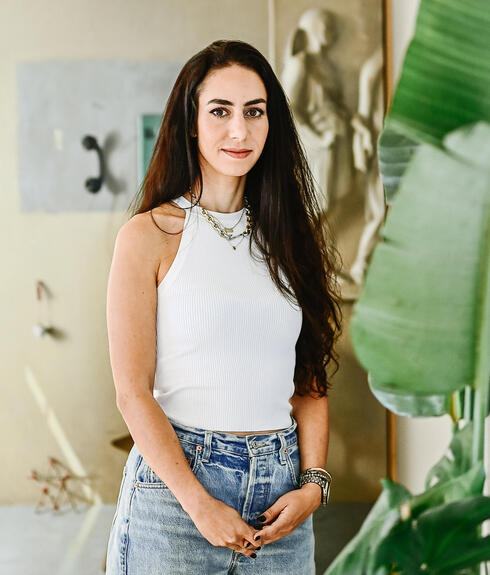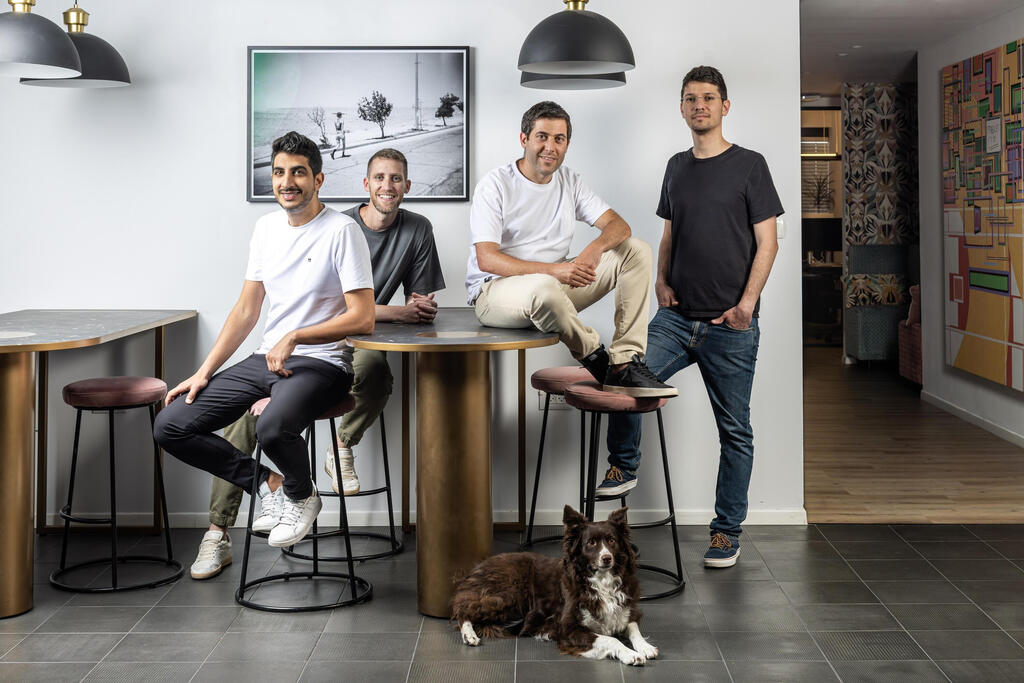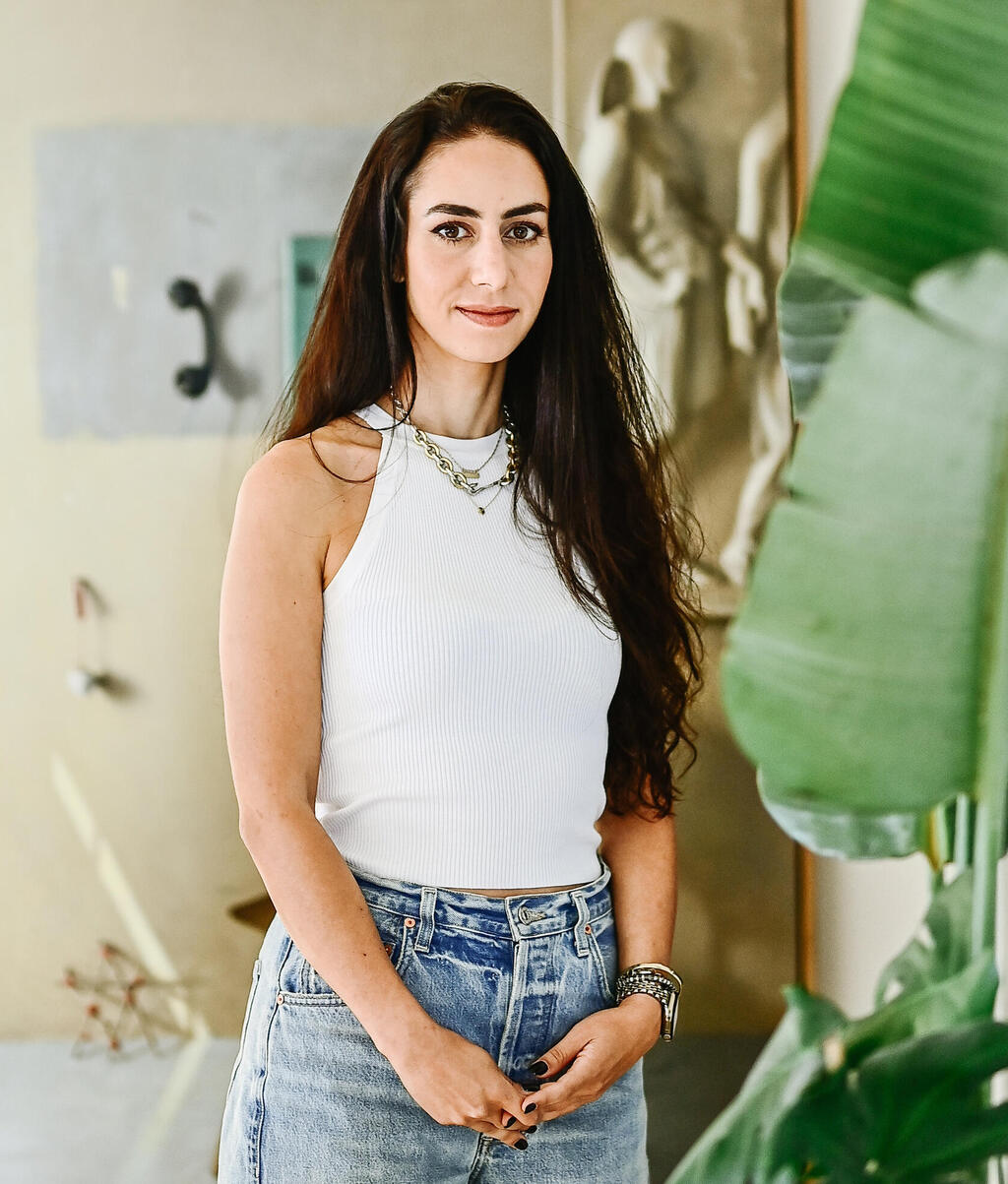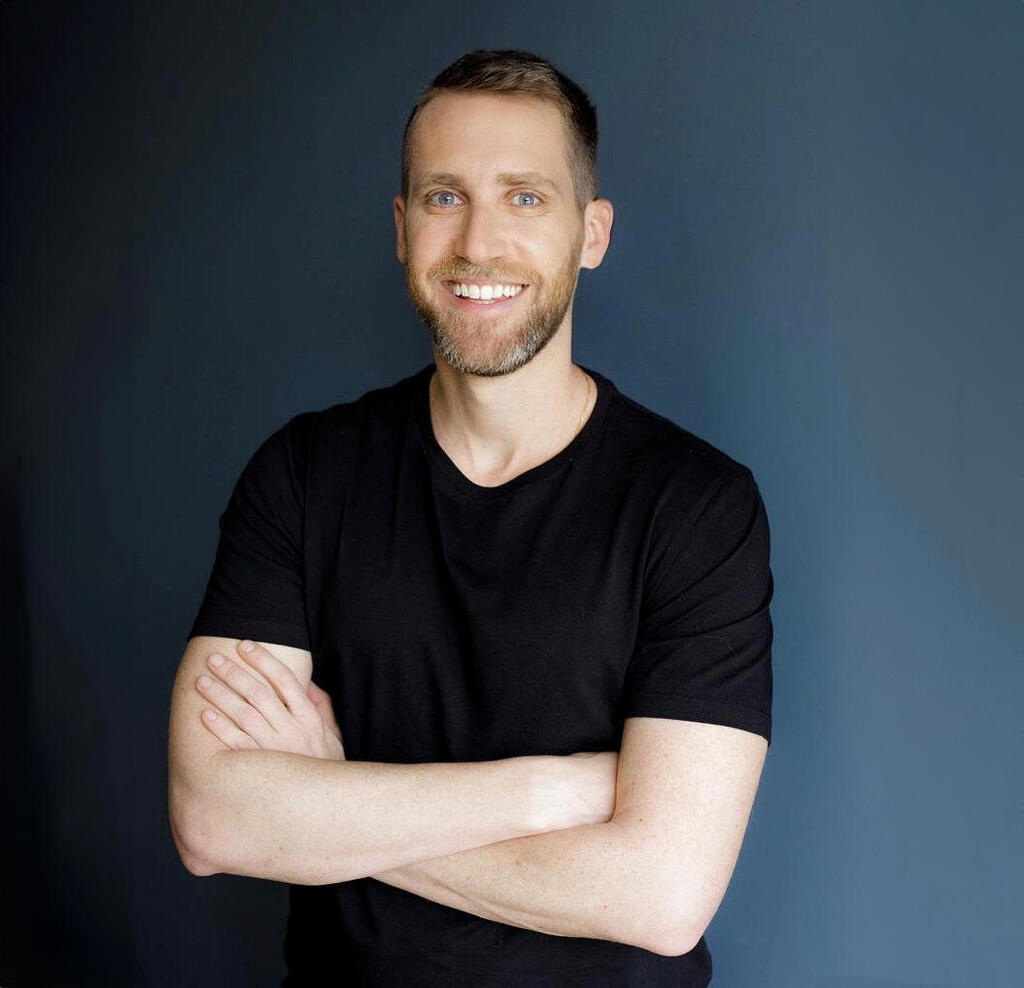
Wiz will be bigger than CrowdStrike and Palo Alto: Cyber decacorn's top female executive shares her vision
A chance encounter with Assaf Rappaport led Raaz Herzberg, Wiz's CMO & VP Product Strategy, to become a key member of the company, helping the cybersecurity startup pivot to cloud security and become a global powerhouse.
Raaz Herzberg's (32) journey at Wiz, the hot Israeli cyber startup, began on a shuttle bus. She worked as a product manager at Microsoft Israel, commuting by bus, and one morning sat down next to Assaf Rappaport, then General Manager of Microsoft Israel R&D. “I sat next to him simply because there was no other seat,” Herzberg recalls. “He’s very approachable, so we started talking.”
“Raaz sat next to me,” Rappaport recalls. “We didn't know each other before, but she was full of amazing ideas about what could be improved at the company. That meeting eventually resulted in the creation of an excellence program for young product managers. Since then, we had many opportunities to talk about security, and whenever I had doubts, I found myself consulting her.”
Rappaport was already an experienced entrepreneur and a highly regarded leader. He reached the top ranks of Microsoft after the giant acquired his cybersecurity company Adallom in 2015 for $320 million, which he co-founded with his three partners, Yinon Costica, Ami Luttwak, and Roy Reznik. In 2019, when the four decided to move on and found Wiz, their first hire was Herzberg, the 27-year-old product manager from that chance encounter on the bus. In many ways, that decision saved their company.
“I was hired to be a product manager at Wiz, reporting to Yinon,” she recalls. “It was during the COVID lockdowns, and we used the time to talk to CISOs (Chief Information Security Officers), who were our potential customers. We gave them presentations, ten a day, and asked for feedback. I remember presenting on the network security problem we intended to solve to the CISOs, and on the other side, the American guy would say, ‘Sounds great.’
“After ten days of such calls, as the product manager, I was supposed to go to developers and tell them, ‘This is what we need to build,’ but then I realized I didn’t actually know what I was asking them to build. It was frustrating because the conversations were too ‘high-level,’ and I couldn’t see how the solution was supposed to look in detail.” Herzberg realized that Wiz’s security product, which had just been founded, wasn’t exciting the customers because it didn’t solve a problem that hadn’t already been addressed. She didn’t hesitate to take her dramatic conclusion to Costica and gently tell him that the company he founded was simply not heading in the right direction.
“She had just joined the company as an employee but listened to the conversations and told us: ‘I don’t understand what difficult problem the product solves for the customer and why it’s important,’” Costica said in an interview with Calcalist last year. “She was the first to alert us that the product was off-course.”
Rappaport also remembers this key moment: “It was really at the beginning when we still called ourselves ‘Beyond Networks’ with a completely different idea. Raaz sat with us - the founding team - feeling like the only one who didn’t understand why the company’s concept was good, and assumed the problem was with her, when really it was with us. In hindsight, thanks to her, we changed direction.”
What exactly happened when you decided to tell the founding team they were off course?
Herzberg: “After the conversations I had, I knew the difference between a customer who says ‘Sounds interesting, keep me updated’ and a customer who says ‘Wow, how much does it cost? I’m connecting you with my team.’ And when I saw that we weren’t fully grasping things, we decided to make a sharp turn and move into cloud security. We called it a ‘suicide move’ because it meant going to organizations that already had a first-generation cloud security solution they had paid for, and we knew we would have to meet a much higher bar to get them to switch.”
Weren’t you afraid?
“The culture here allows every employee to say, ‘This doesn’t seem logical to me.’ It’s a bit like with close family, where you feel comfortable saying anything because you know they’re on your side.”
"More companies are staying private for longer"
Today, Herzberg is the CMO and VP Product Strategy at Wiz, with a team of 50 people under her. She is the most senior woman at the fast-growing cybersecurity company, which is expanding at an unprecedented rate for an Israeli startup and perhaps globally. Five years after its founding, Wiz’s annual revenues have reached half a billion dollars, its cloud security solution is used by 45 of the Fortune 100 companies, and just six months ago, it raised $1 billion at a staggering valuation of $12 billion. But an even bigger drama unfolded in July, when Wiz rejected an astronomical acquisition offer from Google: $23 billion.
How could you say no to such an offer?
“Without specifically referring to Google, but to offers in general: The cloud infrastructure security market in 2023 was about $550 billion. In 2024, it’s expected to grow to $680 billion. The market is growing at a crazy pace, we’re closely tied to that growth, and we fully believe in our ability to be the biggest company in the world in this field. It’s huge, and it’s not worth giving up for any acquisition offer.”
Even when it’s $23 billion?
“CrowdStrike (endpoint security) is worth $75 billion today, Palo Alto Networks (network security) is worth $120 billion. I believe we’ll be bigger because the cloud market is going to be bigger, and we have very strong indicators that our solution is the right one.”
Some say the valuation is inflated.
“When Wiz raises funds, investors scrutinize us thoroughly, and they see that we are selling a solution to the most critical problem in the security market today. I am someone who was born in the cloud, and that's where I spent my decade in the field, but ultimately, only 15% of organizations are currently in the cloud. This means we've just begun. Wiz has infinite potential, and that’s why, for now, we prefer to remain independent.”
We?
“All the founders believe that Wiz should stay independent. An IPO could be an amazing and exciting stop along the way, but it’s still just a stop.”
So, when will you go public?
“We won’t stay private forever, but there's no pressure to go public. We’ve raised enough money, which gives us the privilege to go public at the right moment. In recent years, we’re seeing more and more great companies that remain private for a long time, and the private market knows how to support and finance them. Take OpenAI, for example, and other companies that have raised billions and could have already gone public.”
Assaf Rappaport talked about an IPO when you’d reach around a billion dollars in sales. You're halfway there.
“That’s definitely the goal, but there’s no rush.”
Bloomberg reported that you're in negotiations to sell part of the shares at a valuation of $20 billion. Is this a funding round that hasn't closed yet and got leaked too early?
“I don’t comment on speculation. When a round closes, we provide updates.”
4 View gallery


Wiz founders, from left: Yinon Costica, Assaf Rappaport, Ami Luttwak, and Roy Reznik.
(Credit: Avishag Shaar-Yeshuv)
"I didn’t come from Unit 8200"
Herzberg’s journey into the heart of the cybersecurity industry did not follow the typical path. She served in the military in a technology unit after studying in a science-focused track in high school "where there were maybe three girls in the class." When she finished her military service, she wanted to distance herself from R&D and computer science. "I didn’t want to work in high-tech and enrolled in economics and law at the Hebrew University. The truth is, I didn’t come from the 8200 crowd, so I didn’t think I could."
What happened?
"What happened is that waitressing is exhausting, and in high-tech, you can earn several times more. So, after three months, I came down from that tree. The truth is, I tried several times to distance myself from high-tech; my natural talent is actually in drawing, but in Israel, there’s a gravitational pull toward tech. I didn’t want to do something purely technical, but when I started working at Ginger Software (which developed technology to improve writing), I saw the magic of a startup where half the staff were linguists. That’s the beauty of using technology as a tool to serve another field. In the end, I enrolled in a demanding combined program studying Computer Science at Hebrew university and design at Bezalel. During my studies, I started working as a student programmer at Google, and from there, I moved to product management at Microsoft."
A double degree while working at Google isn't an easy task.
"I finished computer science, but not the degree at Bezalel, due to the workload. But during my studies, I managed to do many projects that combined the two fields."
And have you abandoned drawing since then?
"I’ve painted in many formats over the years, and at Wiz, I actually returned to classic oil painting in a hyper-realistic style. Once a week, I went to study with the painter Erez Aharon, but lately, unfortunately, I don’t have enough time."
So, did you end up in high-tech by accident?
"I came out of my studies as a somewhat confused person with many interests. If tomorrow high-tech didn’t exist, there would still be many things that fascinate me. There are days when I regret not studying law. Public service also appeals to me. I’d love to revolutionize Israel Railways; I traveled by train from Haifa to Tel Aviv for 12 years and the experience hasn’t changed to this day. My dream is to turn that ride into a 20-minute journey like other places around the world."
Wiz’s fifth founder
Despite her lack of experience, Rappaport asked Herzberg to lead the company's global marketing team. "We had two very good American marketing managers in Silicon Valley, but we didn’t feel it was working for us, and two years ago, Assaf told me, ‘I need you in marketing.’ It was so illogical and unrelated that I said, ‘Assaf, come on, I’m busy.’ I didn’t understand the logic, but he believed in me."
In stark contrast to the lack of self-confidence she describes, Herzberg effectively became the informal fifth founder of Wiz, involved in every major decision. By all estimates, she is also the most compensated employee in terms of her stock options.
What was the problem that led them to bring you into marketing?
"Wiz had an excellent product that customers didn’t know about. Every time we reached a new potential client, they’d say, ‘It’s a shame I didn’t hear about you earlier, I already bought another security product.’ No one had heard of Wiz, and that’s a problem."
And what did you do?
"We started with the visual identity issue. I don’t believe in fear-inducing branding, using black or red colors. So, at conferences, we went with pink or light blue. We leaned heavily into 'Wizards' and optimism. At the RSA conference, where all the security companies present and you pay about a million dollars just for the exhibition space, I wanted everyone at the conference to notice us. So, we built a booth with the concept of 'The Wizard of Oz' (Wiz of Oz), and since then, we’ve continued with similar steps."
How do you attract and retain large clients?
"The joke about founders of big cybersecurity companies is that they live on a plane because they spend all day meeting customers. These are million-dollar deals, and the founders want to understand the customer and their needs deeply. So, it makes sense to meet the customers yourself – and we found that I was a significant force multiplier. It was surprising, first and foremost, to me."
What are your success metrics as a marketing manager?
"We had 30,000 followers on LinkedIn, and now we have 250,000. The number of searches for the product, and, of course, the number of deals closed in the past two years. Analysts who three years ago could write about cloud security without mentioning us, now can’t ignore us."
If you're so highly regarded, why aren’t you a formal co-founder in this boys’ club?
"They knew me when I was just an employee at Microsoft and didn’t yet know my abilities. We didn’t have the relationship we have today. They’re a decade older than me, have more experience, and they asked me to do things at Wiz on a scale I’d never done before. We were all pleasantly surprised by my achievements at the company, especially me. They even took a bit of a gamble on me, inviting me to sit with them at the table from the start, allowing me to feel comfortable sharing my opinion, and giving me the opportunity to speak with the biggest clients when, at other companies, only the founders speak to clients in the first two years. It’s really not trivial."
What didn’t you know you could do?
"At Microsoft, I didn’t do things on this scale, and there was also a huge team around me. At Wiz, everything started from scratch. With one of our first major clients, they told me, ‘You’ll close the contract terms with him.’ I was completely shocked, my legs were shaking. In a call with the security manager of a huge company, he started talking about how the contract should be structured for ARR (Annual Recurring Revenue) recognition. I had no idea and texted Assaf during the call, ‘What’s ARR?’ It’s a screenshot we still keep to this day. That call became company lore."
And do you feel like you're working in a 'boys' club' or have a sense of regret that you didn’t found a startup yourself?
"There’s no boys' club atmosphere here. Ami is religious, Yinon and Assaf have male partners - it’s an organization with diversity. It’s not like there’s a clique, and I need to be part of it. I have a once-in-a-lifetime opportunity to be part of an exciting journey, at a company growing faster than any other in the world in terms of sales. I feel a deep sense of belonging and pride, and the title matters less to me. Will I start my own company in the future? Who knows."
And what will happen at the next company they establish?
"If they start a third company and don’t offer me to be a founder, that’s a different story."
"We were born for the cloud"
Let’s talk about competition. You’re talking about making Wiz the biggest company in the field, but you’re still far from the top competitors such as CrowdStrike and certainly Palo Alto, which has sales of $8 billion a year.
"They are amazing companies, leaders in their field, but at the end of the day, CrowdStrike is an endpoint security company, and Palo Alto is a network company. Most of their profits come from these areas, and they existed long before the cloud. Wiz is a cloud company. The market that Wiz wants to lead - the cloud security market - is larger than the endpoint or even network markets."
But the competition understands this too, which is why they’ve acquired cloud security companies.
"In the cloud, we beat them because their solution wasn’t formed for the cloud - it’s not their strength. H&M, for example, is a clothing chain that also started selling some furniture. That’s fine, but for the best furniture, you go to a furniture store."
There are rumors that you’re selling products at a loss to gain market share.
"If you ask people what’s bad about Wiz, they’ll say we’re more expensive than the competitors. I’ll say again, the cloud has turned everything upside down. It’s the biggest revolution ever in the security field."
Did you pop champagne when a CrowdStrike software update caused a global system crash?
"Absolutely not, my heart broke for them. It was a sad day for the whole market. It’s a great company, and I admire the endpoint security brand they’ve built. Our industry’s goal is to protect organizations and help them."
"My mom taught me that you need to strengthen what you’re missing"
Herzberg grew up in Ramat Gan and now lives in Tel Aviv with her partner. Her father, Amir, is a professor of computer science, and her mother, Nava, is a math teacher.
Looking back, your tech path seems to have come from home.
"It seems so, but for both my parents, who are divorced, hard work is more important than talent. My mom has a deep educational principle: you need to strengthen what you're missing."
How did that manifest in your upbringing?
"My natural talent was drawing; from kindergarten, I was really good at it. So, my mom never felt the need to send me to a program to improve my drawing. Instead, she sent me to Scouts and swimming classes - things that were hard for me. If it were up to me, I’d have locked myself in a room, drawing and reading books. But my mom’s approach was 'wherever you're uncomfortable, that’s where you need to push yourself'."
Has that helped you in your career? You're doing something now you never thought you'd do.
"I learned to put fear aside and try, not to decide in advance that something isn’t for me. For girls, the default sometimes is to feel 'I’m not smart or good enough to do something,' but I’ve learned to put that aside. I’m really willing to take the risk of failing. When I took on marketing - which is typically a role that’s hired from the U.S. - I wasn’t afraid of failing. I still think that if tomorrow it turns out I'm not the right person to lead Wiz's marketing, that's okay. Failure is always painted negatively, but in my view, there’s bravery in it."
Why?
"They talk about 'why aren’t there more women in cyber,' I’ve encountered one of the reasons for it throughout my life. Even in school, a girl who thinks she’ll get a 60 in a five-unit matriculation exam will drop to four units instead. When you meet women in computer science at university, they’re great but few, and women who were on their way to finishing a degree with a 75 or lower quit in advance, because of a high standard of perfectionism."
Israeli politician Gideon Sa’ar, on the other hand, had no problem thinking he could be Defense Minister without military experience.
"Exactly, and women are on the extreme opposite end of the spectrum. These gaps start very early and are reflected in the industry. Even when I came to Wiz, I thought, 'they must have made a mistake in hiring me; of course, they’ll fire me.' That’s how I really felt, honestly, deep down. But over the years, I’ve learned to tell myself, 'They believe in you; take the job. At worst, you’ll fail'."
And what will you tell your daughter one day so she doesn’t grow up feeling that way?
"I’ll tell her that getting a 40 on a five-unit exam is super badass compared to dropping down to four units and getting a 100. That place of not trying because you're afraid of failing is where many women are. I know, because I’m still there. I’m always sure I’m going to fail, but I’ve learned to ignore that voice. I’ve learned to give myself the chance to fail."

















